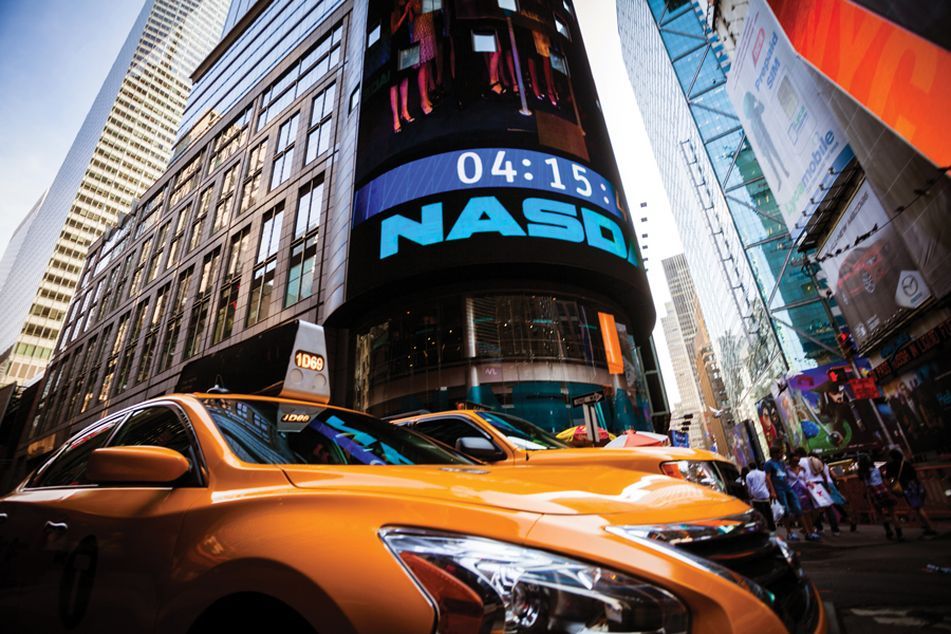Tech sell-off becomes the roughest since 2011

Rising Nasdaq volatility reflects investors' skittishness about the sector.
Another beating in tech shares has thrust the correction that began last month into a league of its own versus past sell-offs.
The numbers are getting ugly. A gauge of 30-day turbulence in the Nasdaq 100 has tripled in five weeks, pushing it to the highest since 2011. Day-to-day swings are averaging 1.7%, half a percentage point more than in February. Prices for options protection in tech exceed the rest of the market by the most in seven years, using implied volatility on the Nasdaq and the S&P 500.
Home to Apple Inc., Facebook Inc. and Alphabet Inc., the Nasdaq 100 dropped as much as 3.1% Monday, extending its three-day decline past 5% and erasing the rally after Election Day. It’s the third time the index has tumbled from around the 7,200 level since early October amid doubts its stretched valuations are justified with its growth advantage fading.
“The rising volatility, the widening price swings reflect investors’ nervousness with respect to the story for tech, which appears to be changing,” said Alex Bellefleur, chief economist and strategist at Mackenzie Financial Corp. “On top of that, there are the macro headwinds. Not only is the earnings growth priced to be lower from where it is, you’re also discounting the earnings at a higher interest rate. That adds to the anxiety.”
It’s getting difficult for investors to dip their toes back into the broad equity market when some of its biggest constituents — which powered U.S. stocks to fresh highs earlier this year — are swinging so fiercely. The 30-session realized volatility of the NYFANG Index — which tracks the FANG quartet and other large tech stocks — hit an all-time high Monday, and exceeds the fluctuations in the S&P 500 by the most on record.
The price swings in the broader Nasdaq 100 have been disconcerting. The 30-day realized volatility in the index of tech megacaps rose to 33.6, tying for the highest since the market rout in September 2011.https://www.investmentnews.com/wp-content/uploads/assets/graphics src=”/wp-content/uploads2018/11/CI1178581112.PNG”
Tech stocks have been some of the biggest victims in a market rout spurred by fears over rising interest rates, slowing growth and a handful of high-profile earnings disappointments. Optimism over technology’s income growth that helped lift the Nasdaq 100 after a bloodletting in February and March.
(More: Faced with market rough patch, stock pickers fail to shine)
Technology firms are still expected to post a 31% earnings growth this year, outpacing the S&P’s 24% advance, but gap will disappear in 2020, Bloomberg data show. Stocks in the Nasdaq 100 Index trade at a 20% premium to the S&P 500.
The options market implies bigger gyrations for the tech-centric index will likely endure. The spread between the Cboe Volatility Index, a gauge of the implied moves in the S&P 500 over the next month, and a similar metric for the Nasdaq 100 is more than two standard deviations above its one-year average.
Among the biggest losers in the technology stocks, Apple plunged 4.5% after the firm disclosed a pair of issues affecting the iPhone X and the 13-inch MacBook Pro. Align Technology Inc. tumbled 8.4%.
Uncertainty is also on the rise among investors in technology exchange-traded funds. They pulled more than $300 million out of tech ETFs last week. While the amount was small, it’s in contrast with inflows seen across the market.
“Earnings are over, there’s no macro data, the only catalyst left this year is a Fed hike,’ said Michael Antonelli, an institutional equity sales trader and managing director at Robert W. Baird & Co. “All bulls have right now is a prayer that a Santa Claus rally shows up.”
Learn more about reprints and licensing for this article.







